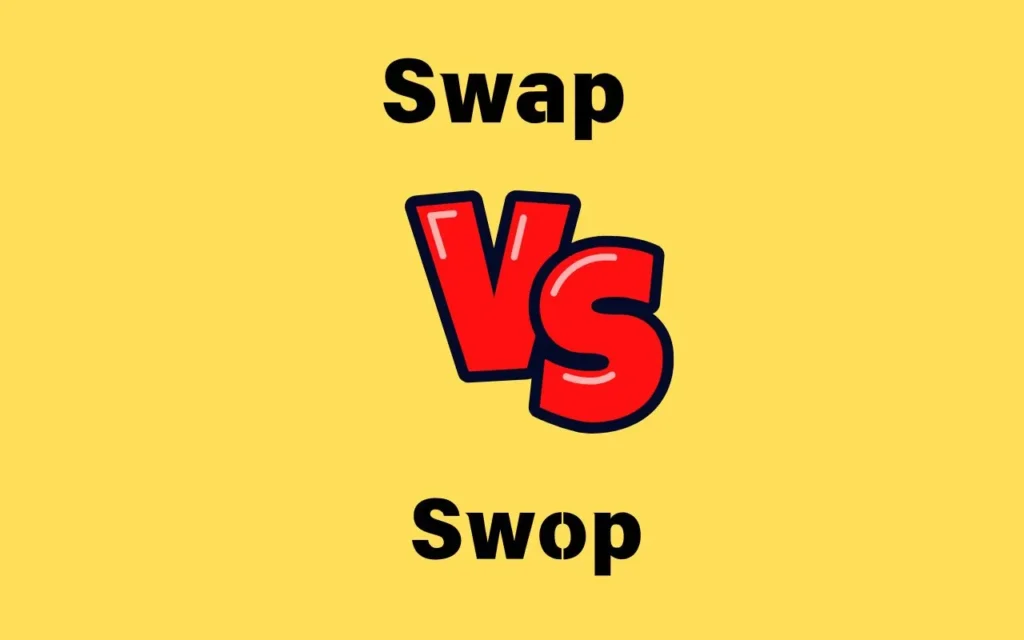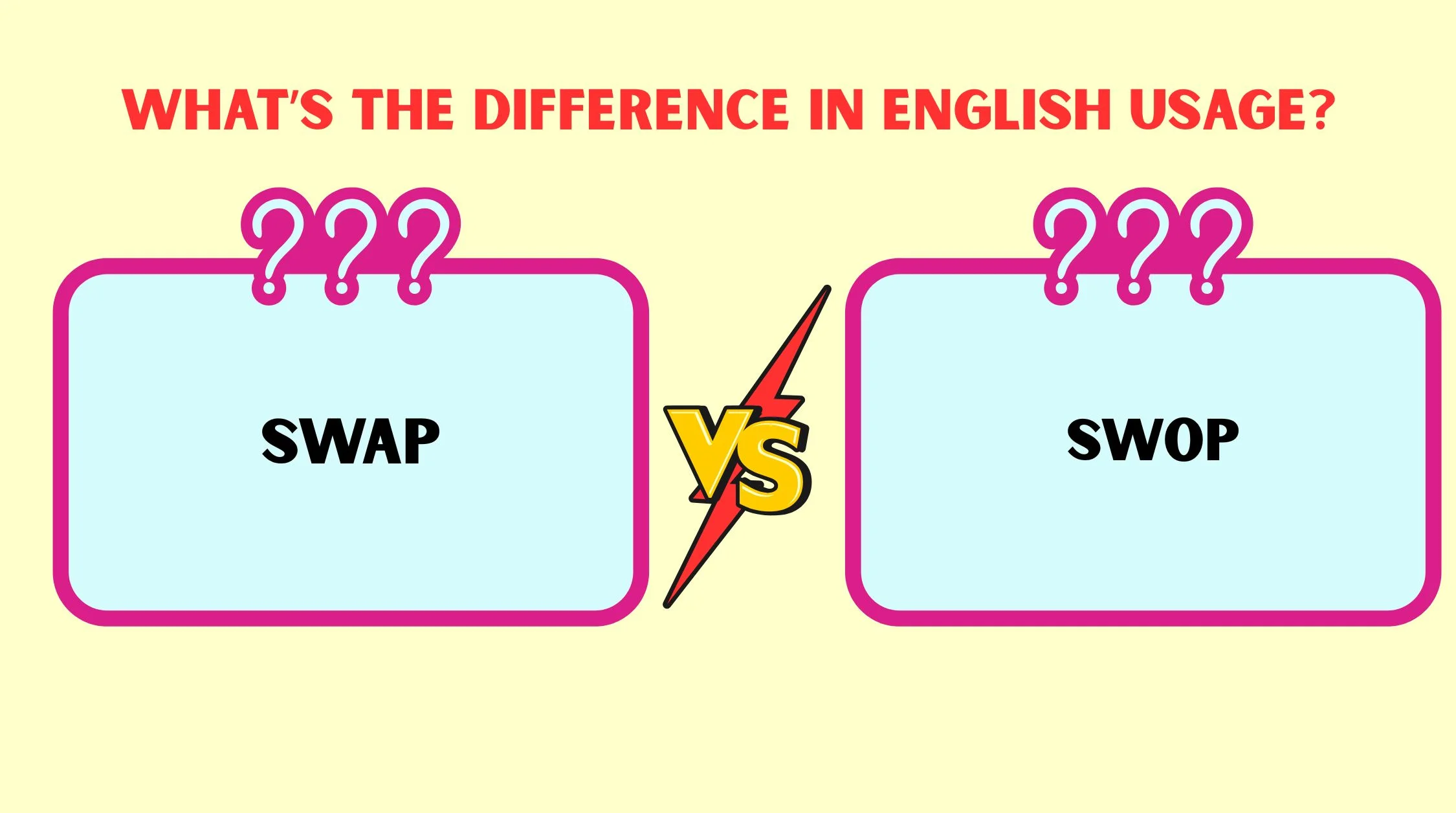Last updated on September 29th, 2025 at 11:19 am
English has a fascinating way of evolving across time and geography. Words often develop alternate spellings, pronunciations, and usages depending on where you are.
One such case is “swap vs swop.” At first glance, both spellings look legitimate. They even sound the same. Yet when you dig deeper, you discover that one dominates modern English while the other is now little more than a regional variant.
This article takes you through the meaning, history, and practical usage of swap and swop. By the end, you’ll know exactly which one to use in your writing and why.
What Do Swap and Swop Mean?

Both swap and swop are verbs meaning “to exchange one thing for another.” For example:
- Let’s swap seats so you can see better.
- He decided to swop his sandwich for a slice of pizza.
Although the action is identical, the spelling tells the real story.
- Swap: This is the standard spelling in modern English worldwide.
- Swop: This is an older variant still recognized in some dictionaries, but rarely used outside the UK or older British texts.
Historical Roots
The word traces back to Middle English swappen, meaning to strike, hit, or exchange. Over time, the meaning shifted toward “exchange,” which stuck. Early English often allowed multiple spelling variations. Just as “color” and “colour” coexisted, so did “swap” and “swop.”
By the 20th century, however, swap became the dominant spelling. The “o” form (swop) remained in circulation but began to feel old-fashioned. Today, you’ll see swop mostly in older British books, nostalgic writing, or niche regional use.
Swap vs Swop: Key Differences at a Glance
To help you quickly see the contrast, here’s a comparison table:
| Feature | Swap (Standard) | Swop (Variant) |
|---|---|---|
| Meaning | Exchange one thing for another | Same meaning (exchange) |
| Spelling Status | Modern, dominant, widely accepted | Variant, outdated in most contexts |
| Dictionaries | Fully recognized and preferred | Listed as British variant or archaic |
| Usage in Writing | Common in all professional settings | Rare; appears in British/older texts |
| Regions | Global (US, UK, Australia, worldwide) | Mostly UK; little to no US recognition |
Usage in Different English-Speaking Regions
Even though both forms exist, regional preferences shape which spelling you’ll actually see.
United Kingdom
In the UK, swop enjoyed stronger presence during the 19th and early 20th centuries. Newspapers, novels, and children’s stories often used it. However, by the late 20th century, swap overtook swop as the preferred form.
Today, British dictionaries like Collins and Oxford still list swop, but always mark it as a variant. British teachers, publishers, and editors almost exclusively recommend swap for clarity and consistency.
United States
In the US, the case is clear-cut. Americans never really embraced swop. From the start, swap became the only accepted spelling. American dictionaries such as Merriam-Webster and American Heritage don’t even list swop as a valid option in modern editions.
So if you’re writing for a US audience, the answer is simple: always go with swap.
Australia & New Zealand
Australians and New Zealanders tend to follow British usage more closely than American. Historically, swop appeared in Australian children’s literature and newspapers. But just like the UK, the tide shifted toward swap.
In everyday speech and writing, swap dominates modern Australian English. You might still come across swop in informal or nostalgic contexts, but it’s not the norm.
Other Regions
Across other parts of the English-speaking world — including Canada, South Africa, and India — swap is standard. Swop is so rare outside the UK that most readers wouldn’t recognize it as a legitimate spelling.
Real-Life Examples
Seeing words in context helps cement their differences. Let’s look at both spellings in action:
Examples with Swap (Modern Standard):
- The two students decided to swap books after class.
- I’ll swap you my chocolate bar for your bag of chips.
- They swapped stories about their childhood adventures.
Examples with Swop (Variant):
- He offered to swop his marble for a shiny coin.
- In the old tale, the children swopped places to trick their teacher.
- Grandma laughed as she recalled swopping letters with her pen pal.
Notice how swop feels old-fashioned in modern writing. Readers may pause, wondering if it’s a typo. Swap, on the other hand, feels smooth and natural.
Dictionaries & Style Guides on Swap vs Swop
When deciding which spelling to use, it helps to know what trusted authorities say.
- Oxford English Dictionary (OED): Lists swop as a variant of swap, but marks swap as the preferred spelling.
- Collins English Dictionary: Recognizes swop as chiefly British, labeling it less common than swap.
- Merriam-Webster (US): Only lists swap, no mention of swop.
- Cambridge English Dictionary: Includes swop but notes that swap is standard.
Style Guide Recommendations
- The Chicago Manual of Style (US): Always swap.
- Oxford Style Guide (UK): Prefers swap for modern usage.
- Associated Press (AP): Swap only.
In short, if you’re writing in any professional, academic, or journalistic context, style guides tell you: use swap.
Which One Should You Use Today?
Here’s the bottom line:
- For professional, academic, or international writing: Always use swap.
- For casual or nostalgic writing (especially in the UK): You may use swop, but be aware it looks old-fashioned.
- For learners of English: Stick to swap to avoid confusion and ensure your writing feels natural everywhere.
Why Clarity Matters
Language evolves, but communication is the end goal. Using an outdated spelling like swop can distract readers. They may question your credibility, think it’s a typo, or misunderstand the level of formality you intend. Swap avoids all those problems.
As the linguist David Crystal once noted:
“Variation is natural in language, but clarity comes from following the conventions your audience expects.”
So unless you’re deliberately aiming for a nostalgic or British-localized tone, swap is the smart choice.
❓ FAQs
What is the difference between swap and swop?
Both mean “to exchange,” but swap is the modern standard, while swop is an older British variant.
Is swop still used in the UK?
Yes, but rarely. Swop appears in older British texts, though swap is now the preferred spelling.
Do swap and swop mean the same thing?
Yes, they carry the same meaning. The difference lies in spelling and regional acceptance.
Which is correct: swap or swop?
Swap is correct in modern English worldwide. Swop is outdated and not recommended for formal writing.
Is swop used in American English?
No. American English only uses swap. Swop is not recognized in US dictionaries.
Should English learners use swap or swop?
Learners should always use swap since it’s standard across all regions and contexts.
Conclusion
The debate of swap vs swop is really no debate at all. Both words mean the same thing, but one (swap) has become the dominant, modern spelling across the English-speaking world. Swop lingers as a quaint relic of British English, occasionally spotted in older literature or nostalgic writing.
If your goal is clarity, professionalism, and global recognition, the answer is simple: always choose swap.
